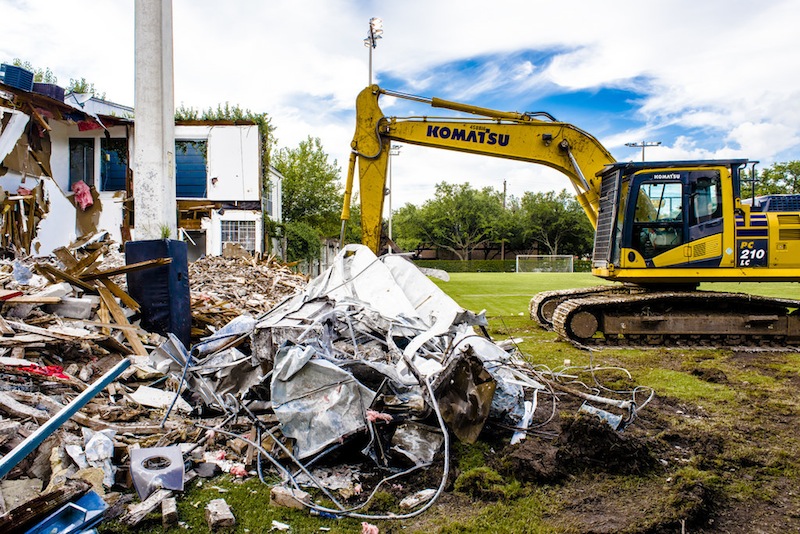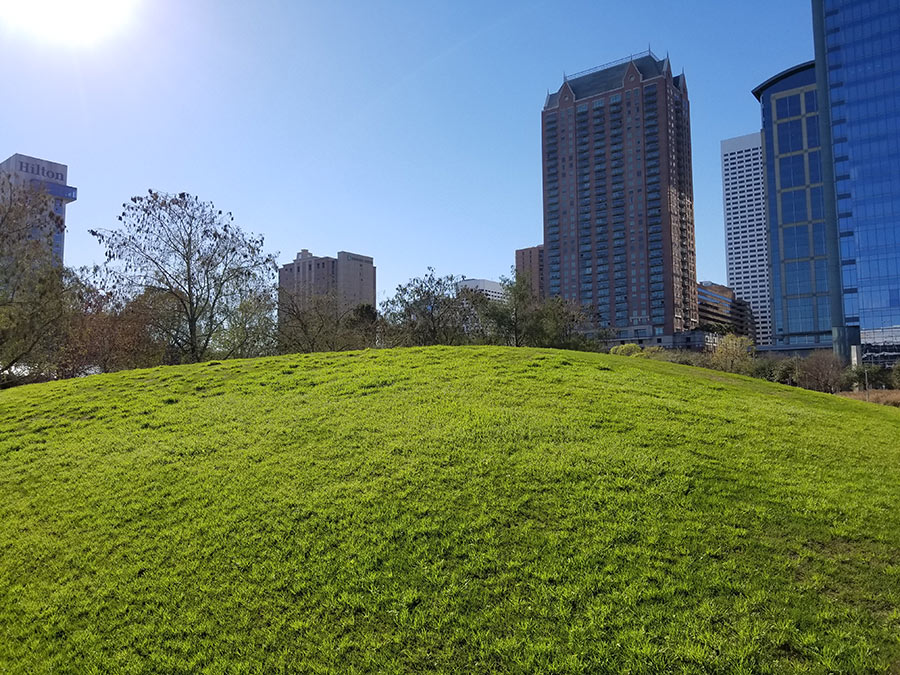
- Medistar Buys 177 Acres in Webster from ExxonMobil for Hotel, Conference Center, Retail, Office, Medical Facilities, Each with Its Own Parking Lot [HBJ]
- The Woodlands Township Plans To Buy 11.6-Acre Property from Division of GE for Future Governmental Buildings [HBJ]
- Houston Homes Cheaper To Buy Than National Average, but Owners Pay More To Keep Them Over Time, According to U.S. Census Report [HBJ]
- How Houston Manages Urban Growth Without Zoning [Here & Now]
- Mattress Firm’s New Headquarters To Add ‘Sleep Center,’ Fitness Center, Wellness Clinic, Walking Trails [HBJ]
- Stella McCartney, Van Cleef & Arpels, Vilebrequin, Davidoff of Geneva, Steak 44 Among Group of 8 Retailers and 1 Restaurant Announced for River Oaks District Opening Later This Year [Prime Property]
- Club Pilates Opening First Texas Location July 11 at 14129 Memorial Dr. [Prime Property]
- Harris County Considering Adding Major Bond Referendum for Roads, Bridges, Flood Control, Parks, Libraries to November Ballot [Houston Chronicle]
- Houston Sales Tax Revenues Dip for First Time in 53 Months [Houston Chronicle]
- Opinion: Houston Should Drop Speed Limits to 25 MPH or Lower To Reduce Fatalities [Houston Chronicle]
- Houston Has 10 of the Top 20 Most Congested Roads in the State, According to Texas Transportation Institute Study [abc13]
- Metro Bus and Train Trips Will Be Free Aug. 16—22 for Rollout of New Bus Network [The Highwayman]
- Galveston County Beaches Test High for Fecal Bacteria [KHOU]
- Arsonists Have Torched More Than a Dozen Galveston Palm Trees Since January [Galveston County Daily News ($)]
- Remembering When ‘Robocop 2’ Was Filmed in Houston [Houston Chronicle]
Photo of demolition at 1124 Colquitt, next to University of St. Thomas: Alex Steffler via Swamplot Flickr Pool
Headlines





Re: Home chaper than natl average – They didn’t add water bills with our drainage fee/tax. That will bump it up even more.
The only reason its the most congested is because they built that darn light rail! If they did what I wanted in 2003— Carefully demolish the entire uptown galleria area, and replace it with freeway, this wouldnt be a problem. Why don’t we just keep building freeways until the congestion goes away?
@HouCynic. Just out of curiosity how much is your annual drainage fee?
Notcommonsense is right. The city is overthinking the whole situation. Build more freeways, expand freeways, add more managed lanes, build more tollways.
.
We can build ourselves out of this situation if we just pour more concrete.
.
I-10 expansion was a good start, but it needs to be expanded more, then all the other freeways need to be expanded equally. There’s all that undeveloped land up near memorial drive that they can use to make more freeway as well.
On a serious note, I do wonder what the median size of a home is nationally, and in Houston? and then, median lot size nationally, and in Houston?
.
It’s not just about how much it costs, but what you get for your money. You can spend $275,000 for 10,000 sf of land with a 2,500 sf 4br 2.5bath monstrosity in Sugarland, or you can buy a <1500sf 3br 2bath home in lake forest Ca.
.
both suburbs of large cities.
.
So in Houston you have to consider higher costs after the sale, but the point is you get more for your money here, why is that so hard to accept for hbj, and others?
RE: Growth without Zoning – I could go either way on this issue but I live with the decision that the voters have taken in the 90s… No Zoning! If you don’t do your research, sink a ton of money into a house or property and then don’t like what happens around you… well tough $#^%! If you are a long time resident and the world is changing round you and you didn’t vote for zoning then tough $#^%! This is Houston now! The rapid organic change they reference in the radio article is now felt everywhere and by more people. Your only recourse is to buy in a neighborhood with strong deed controls, a master planned community or a Historic District else reap the benefits of a non-zoned city. I have sympathy for those in a Historic District as they still have yet to prove they can consistently enforce the codes and develop standards that remove opinion based decisions and outcomes. For the rest of you who buy a house in an area without the controls that protect your investment then tough crap and good luck!
That Medistar site plan is actually pretty damned walkable, for an outer-suburban feeder road site. I’d slot it below Sugar Land Town Center, but above “Northwest Station.” The important thing is the bones are there, so as demand warrants they can go in and add parking garages and donut midrise. If you try to do density/transit before the market is there, you end up with the sort of sadness that is the Las Colinas personal transit.
HouCynic,
“The rapid organic change they reference in the radio article is now felt everywhere and by more people.”
This is where you are wrong. ~99.999% of single family homes inside the loop are completely surrounded by other single family homes. Restrictions on increasing densification in the very few areas that are facing it will actually make the main complaint (traffic) about densification worse for the metro area as a whole. Really what has a worse impact on traffic? 10 new townhomes in Montrose, or 10 new single family homes in Sugar Land?
For a city without zoning, development in Houston isn’t much different that it would be if we DID have zoning. Most retail development happens on major commercial thoroughfares, and most industrial sites are either along railway lines or otherwise clustered together. And development still has to comply with our (idiotic) setback requirements and parking minimums.
The main difference Houston has over other cities with stricter land use regulation, is the ability to increase residential density in a fairly timely manner. This has helped keep housing costs from rising higher than they otherwise would have. The kinds of land use regulation in cities like New York, Washington and San Francisco generally benefit wealthy landowners at the expense of younger, poorer new-comers. Even current middle-class homeowners don’t really benefit: you can’t bank the appreciation until you sell, at which point you still have to live somewhere, and in the meantime, your property tax bill is higher.
@JT My drainage fee is $5 per month which is nothing I admit but I do have a permeable driveway and ditches not curbed streets. Others who have more land, longer paved driveways and larger roofs will pay more. BTW my sewer fee is much larger nearly a 1/3 more than my water bill. So sewer fee and drainage is nearing $55 per month which I am sure is a whole lot less than most single family homes in parts of the city are paying.
.
@awp – you missed my point… of the ~99.99% you quote do you know how many are in deed restricted neighborhoods? Or have restrictions that protect from subdividing and multi family builds? If you listened to the article the folks who are unhappy are those who live near or on the fringes of commercial streets (Ashby). My point is that you MUST do your research before you buy in order to protect your investment. It is becoming more common for really nice neighborhoods (like near Ashby) to experience mid or high rise construction without deed restrictions in place. But deed restriction isn’t always a guarantee either. If you are in a deed restricted neighborhood and one house or street away from a commercial you better be ready for what could possibly be built along the commercial street just outside the deed restricted area.
.
@Angostura – not sure what fantasy land you live in but development never benefits they young, new-comers or middle-class. Development only benefits the developers and land owners. What you are looking for is mixed income multifamily developments where a percent of units are reserved for qualifying low income buyers and the rest are sold at market rates so developers can still profit. Somewhat successful in the northeast due to the ever increasing cost of real estate but I doubt an attractive model to Houston developers. These multi income developments are usually tied to tax break incentives for developers or city requirements when low income residents are displaced by major developments. Houston still has cheap housing although reality is less and less of it being inside 610.
Houston has zoning. It’s called the market. Developers who do not follow the market are punished accordingly. I have ZERO confidence that a bunch of politicians would do any better.
The survey data includes the universe of all owned housing within the Houston MSA, so comparisons between Houston and other cities that grew at different rates in different eras aren’t really possible to make. If we were to narrow the range of comparison to single-family homes built between 2000 and 2010, that would be more telling…but also, the Census’ sample size would be reduced so much that you’d start having to worry about the statistical margin of error.
@Bernard: I always chuckle a bit when someone thinks that the free market governs Houston because the City doesn’t have zoning.
.
Aside from land-use restrictions, every regulation that is usually found in a zoning ordinance, is in force in Houston. Tree and landscape requirements. Setbacks. Sign ordinance. Curb cut requirements. Buffering. Parking requirements. Traffic study requirements. Plan reviews for subdivisions. Regulations for building in flood plains and finish floor elevations. The list goes on. And like every other city, Houston enforces building, electrical, fire, residential, and plumbing codes (with amendments). So contrary to what a lot of a lot of people think, Houston is not a developer’s free for all. (Not that it wasn’t in the 1970s, but I digress)
.
If anything, it’s harder to build in Houston because the regulations are so damned hard to find sometimes. In most places, it’s all neatly packaged in a Zoning Ordinance. In Houston, it’s all over the Code of Ordinances, and you have to know where to look. as HouCynic noted, Houston enforces neighborhood deed restrictions, but The County Clerk actually records those Restrictions, so it’s not a one-stop-shop.
.
@HouCynic: it’s true that a smart buyer does research, but 1: few average home buyers have he time or the expertise to do that research, and 2: there is no perfect house. Say the house is in a nicely protected, deed restricted neighborhood, but has bad schools, or maybe it’s miles away from everything, or it’s way over your price range, or it’s just flat out ugly. I just left a bigger house that was in better shape and closer to my office. I doubled my commute and moved into a smaller house that needs work. I did it for the schools. So it’s really not fair to just say “you all need to do your research, and if you didn’t, don’t whine.”
Bernard,
Parking requirements, setbacks, etc. aren’t the “market”.
Will people ever realize that changing/add a laws does not automatically change behavior?
Re: Harris County bond referendum for roads
The link is broken but here is a working link: http://blog.chron.com/thehighwayman/2015/06/harris-county-road-bond-possible-for-november-vote/
To the topic: I’m not a fan of approving more bond debt since the costs of a new road to a development way out into the suburbs are passed on to me. I live in town and close to my workplace: good for the wallet and good for the environment. Let those who live out there pay a toll to come into the city and a toll to go back out to the hinterlands.
@ZAW – I stand by my statement… buyers do your research or else suffer the consequences and no whining. There is no excuse for not doing research otherwise it is nothing more than an emotional purchase. Any purchase contrary to what research indicates you should do is a compromise. You just admitted that you compromised by selecting a better school district over location and house size.
@ Major Market: The devil will be in the details. There’s a massive population in unincorporated Harris County (some of which is actually pretty dense by Texas standards) that already deals with seriously bad congestion, and toll roads aren’t going to help them at all unless and until the state legislature reconsiders how we do toll roads and how to better divvy up the burdens of transportation finance. They’re constituents, too. They pay taxes. They are the workforce. They are the customer base. If they’re getting served, I’d be inclined to support the measure. Its important that existing neighborhoods should remain viable, even if you really really wish that the government would make your particular commute really awesome because its yours.